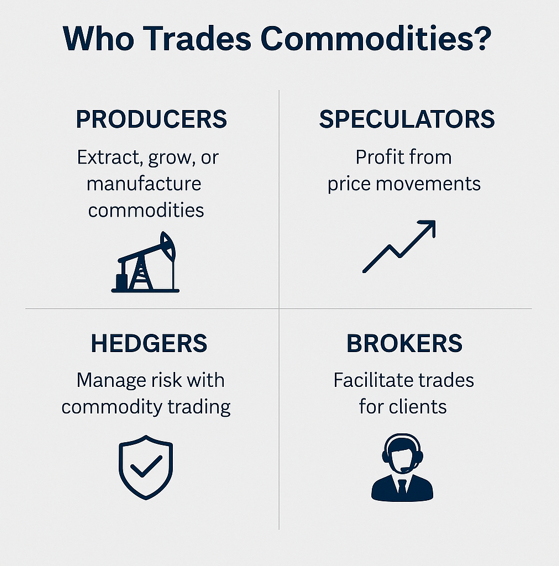Introduction
Commodities are basic goods or raw materials that are used to produce other goods and services. Unlike company shares or currencies, commodities are physical, tangible items—think of oil, gold, coffee, or wheat.
They’ve been traded for thousands of years, from ancient marketplaces to today’s sophisticated global exchanges. Commodities play a vital role in the global economy, influencing everything from the cost of your morning coffee to the price of a plane ticket.

Main categories of commodities
Commodities fall into two main groups – hard commodities, which are mined or extracted, and soft commodities, which are grown or produced – each with unique characteristics, uses, and market drivers.
Hard commodities
- These are natural resources that are mined or extracted from the earth. They typically require significant industrial processes before reaching the market.
- Examples: Crude oil, natural gas, gold, silver, copper, aluminum.
- Key Traits: Non-perishable, often used in manufacturing, construction, and energy production.
- Example in Action: Gold is seen as a safe-haven asset in times of economic uncertainty, while oil prices can surge when geopolitical tensions disrupt supply chains.
Soft commodities
- These are agricultural products or livestock that are grown or raised rather than mined.
- Examples: Wheat, corn, coffee, sugar, cocoa, soybeans, cattle.
- Key Traits: Perishable, heavily influenced by weather patterns, seasons, and agricultural conditions.
- Example in Action: Coffee prices can spike after poor harvests in major producing countries like Brazil, while droughts can push wheat prices higher.
Who trades commodities?
From producers who bring raw materials to market, to speculators chasing price movements, hedgers managing risk, and brokers facilitating trades – commodity markets are driven by a diverse mix of participants, each playing a unique role.
- Producers: These are the companies or individuals who extract, grow, or manufacture commodities—such as mining firms, oil companies, and farmers. Producers often sell their output directly into the market to generate revenue or secure contracts in advance to guarantee future prices.
- Speculators: Traders and investors who buy and sell commodities purely to profit from price movements. They don’t take delivery of the physical goods; instead, they trade futures contracts or CFDs to capitalize on market trends and volatility.
- Hedgers: Businesses that use commodities to protect against unfavorable price movements. For example, a food manufacturer might purchase wheat futures to lock in ingredient costs, or an airline might secure fuel contracts to manage operational expenses.
- Brokers: Intermediaries who connect buyers and sellers in the commodities market. They facilitate trades for both retail and institutional clients, often providing market analysis, trading platforms, and order execution services.
